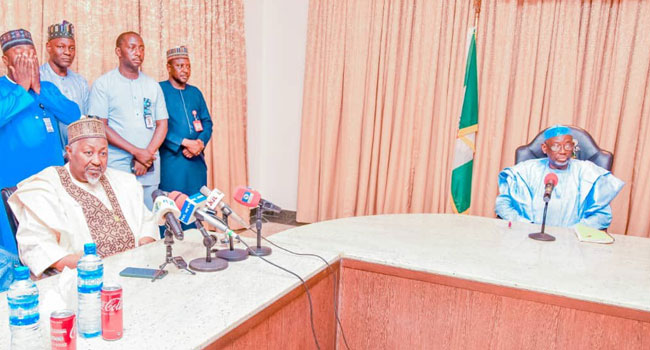In a heartfelt show of solidarity and support, Nigeria’s Defence Minister, Mohammed Badaru, has donated ₦20 million to assist victims of the devastating floods that have recently wreaked havoc across Jigawa State. The donation was made during Badaru’s visit to the state capital, Dutse, on Saturday, where he met with Governor Umar Namadi and offered his condolences to the families who have lost loved ones and to those who have been displaced or otherwise affected by the natural disaster.
The floods, which have invaded vast areas of the state, have had a catastrophic impact on the local population. According to Minister Badaru, the deluge has affected 148 communities spread across 14 local government areas, displacing approximately 50,000 people and damaging over 11,500 households. The scale of the disaster is staggering, with over 11,500 farmlands also reported to be under water. Tragically, the floods have claimed the lives of 33 residents, underscoring the severity of the situation. “Over 148 communities were affected,” Badaru lamented. “7,500 households were affected, over 50,000 people were affected, and about 11,500 farmlands were also affected while we lost 33 indigenes of the state as a result of this affliction.”
 The Defence Minister emphasized that his donation was a personal gesture aimed at alleviating the suffering of the flood victims. He called on both the governor and the affected communities to see the disaster as a test from Almighty Allah and to remain steadfast in their faith while also taking proactive measures to reduce the impact of such calamities in the future. “This disaster is a reminder of the unpredictability of life and the importance of preparedness,” he said. “While we submit to the will of Allah, we must also do everything within our power to mitigate the damages caused by such natural events.”
The Defence Minister emphasized that his donation was a personal gesture aimed at alleviating the suffering of the flood victims. He called on both the governor and the affected communities to see the disaster as a test from Almighty Allah and to remain steadfast in their faith while also taking proactive measures to reduce the impact of such calamities in the future. “This disaster is a reminder of the unpredictability of life and the importance of preparedness,” he said. “While we submit to the will of Allah, we must also do everything within our power to mitigate the damages caused by such natural events.”
Governor Umar Namadi expressed deep gratitude for Minister Badaru’s visit and the substantial donation, acknowledging the minister’s personal commitment despite his busy schedule in Abuja. “Your decision to be here physically, not only to offer your condolences but also to contribute a significant sum of money, speaks volumes about your dedication to the people of Jigawa,” Governor Namadi said. “We are truly grateful, and may Allah reward you abundantly. This situation affects us all, and your support is invaluable in these trying times.”
A Flood Crisis of Unprecedented Proportions
While flooding is a recurring issue in Jigawa State, often attributed to the state’s geography and climatic conditions, the current situation has been described by many as the worst in recent memory. The State Emergency Management Agency (SEMA) has reported a cumulative death toll of 50 people across the state’s 27 local government areas due to flooding this year. Yusuf Sani, the head of SEMA, painted a grim picture of the situation, noting that incessant rains had compounded the crisis. “The last few days have been quite challenging as rain fell for three days non-stop,” he explained. Emergency response teams have been dispatched to affected communities to assess the scale of displacement, which Sani estimates to be in the thousands. The scale of the destruction has been overwhelming, with entire communities submerged, homes destroyed, and livelihoods lost.
Kafin Hausa district, in particular, has been severely affected, with 10 fatalities reported, 68 individuals hospitalized, and 1,436 residents displaced. The village of Balangu bore the brunt of the disaster, with 237 houses destroyed, leaving hundreds homeless. The state has established 11 temporary shelters, many of which are housed in schools currently closed for the holiday season, to accommodate those displaced by the floods. One such shelter is a primary school in Kirikasamma district, where Aminu Ibrahim and 12 other families are now residing after their homes were washed away. “We lost everything,” Ibrahim said. “Our homes, our farms… everything is gone. Now we depend on the help of our relatives and the state.”
An Uncertain Future Amidst Ongoing Challenges
The situation remains precarious, with meteorologists predicting more torrential rains in the coming days, raising concerns that the flooding could worsen. Compounding these fears is the anticipated release of water from the Komadugu River, a preventive measure intended to stop the riverbanks from bursting but which could lead to further flooding. SEMA has issued warnings to residents living along the riverbanks to evacuate immediately, fearing that the water release could have devastating consequences. “We have asked all residents of villages along the river banks to evacuate as soon as possible because the water would be released any moment from now,” Sani warned.
The flooding is exacerbated by additional factors, including the overflow of the Tiga and Challawa rivers from neighbouring Kano State into Jigawa. According to local official Hamza Muhammad, these rivers substantially aggravate the flooding situation each year. He also pointed to other contributing factors such as inadequate drainage systems, the clogging of river canals by weeds, and illegal constructions on waterways. “The unusually heavy rains, which can be attributed to climate change, have made things worse,” Muhammad noted. The cumulative impact of these factors has resulted in a flood disaster of unprecedented proportions, with severe consequences for the state’s agrarian communities.
Historically, flooding has been a significant problem in Jigawa State. In 2020, for example, floods claimed at least 40 lives and destroyed more than 100,000 hectares of crops, according to SEMA. The recent floods have reignited concerns about the state’s preparedness for natural disasters and the need for long-term solutions to mitigate the impact of such events. On August 4, a two-day heavy downpour led to flooding in Ajingi district, killing three people and displacing nearly 500 residents, further highlighting the need for urgent action.




